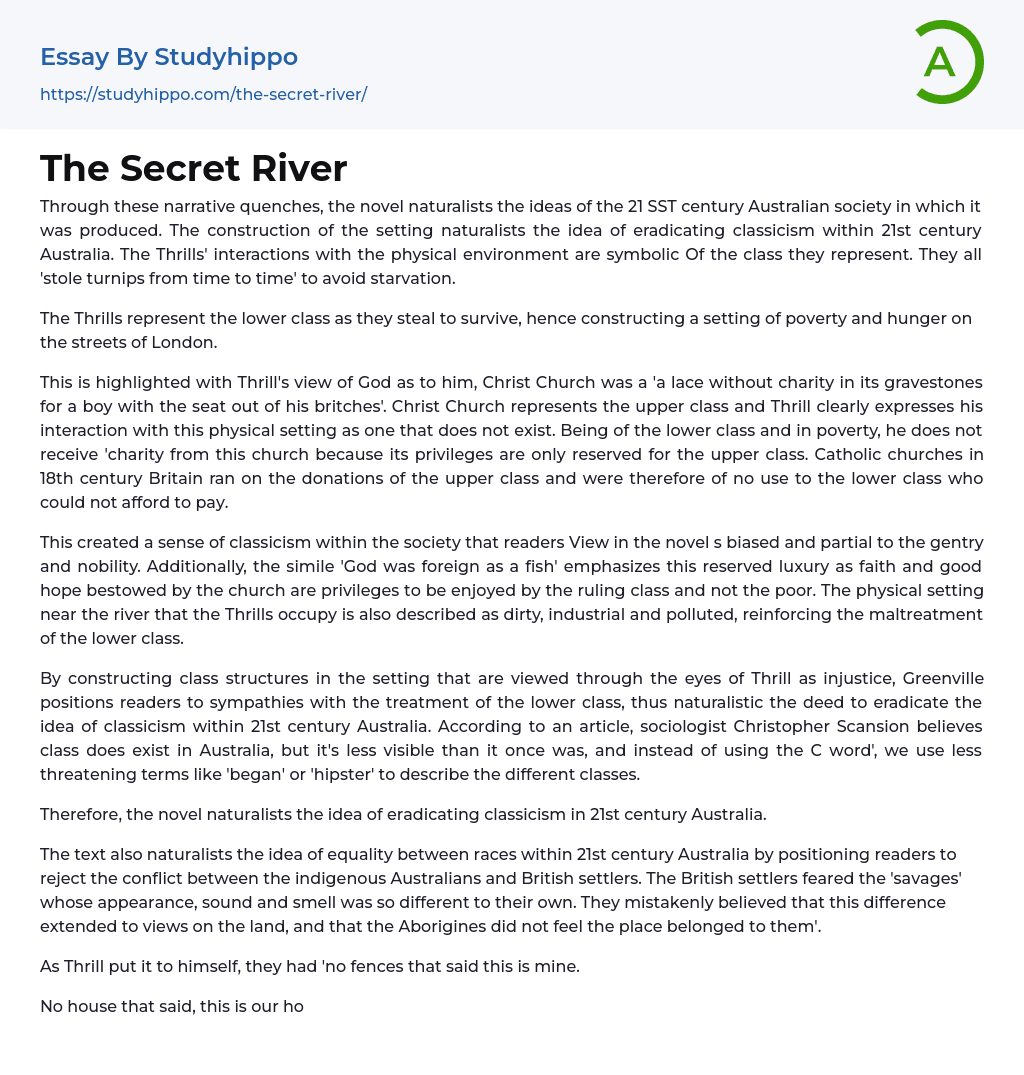The novel portrays the ideas of contemporary Australian society in the 21st century by incorporating narrative descriptions. The setting is constructed to eliminate classicism in Australia. The interactions of the Thrills with their physical environment are indicative of their social class. To prevent starvation, they resorted to stealing turnips occasionally.
Thrill perceives God through his view of Christ Church, which is portrayed as a place devoid of compassion for the poor. In his eyes, the church represents the upper class, which he does not belong to, and therefore feels excluded from its privileges. Despite being in poverty, Thrill does not receive any assistance from the church because it runs on donations from the rich, a common practice in 18th century Britain. This highlights the inequities in society at the time, where the lower class could not afford to benefit
...from Catholic churches.
The novel portrays a classicism that favors the gentry and nobility, which society perceives as biased. The simile 'God was foreign as a fish' highlights this exclusivity, implying that faith and hope provided by the church are privileges reserved for the ruling class rather than the poor. Along with this, the physical location of the Thrills near a polluted, industrial river further emphasizes the mistreatment of the lower class.
Greenville positions readers to sympathize with the treatment of the lower class by constructing class structures that are seen through Thrill's eyes as unjust. This naturalizes the need to eliminate classicism within 21st century Australia. Sociologist Christopher Scansion asserts that although class does exist in Australia, it is less conspicuous than before, and terms like 'bogan' or 'hipster' are used instead of
the controversial 'C word' to characterize different classes, as per an article.
Thus, in 21st century Australia, the novel proposes the abolition of classicism by naturalists.
According to Thrill's own thoughts, there were no boundaries that separated what belongs to whom.
In Greenville, conflict arises over ownership of the land as fear and anger increases. Some individuals begin to kill the Aborigines and justify their actions by blaming the Aborigines for instigating the conflict.
In addition, Blackfoot's frequent reminder to Thrill about the importance of "giving a little, taking a little" emphasizes the need for sharing and compromise to maintain equality and prevent violence. Thanks in part to the elimination of the White Australia policy following World War II, contemporary Australian society is multifaceted, allowing people of various ethnicities and cultures to coexist peacefully with non-indigenous Australians.
The text emphasizes the significance of maintaining equality regardless of race on the land that different races call home. By depicting Sal Thrill as an empowered woman in the 18th century British society, the text promotes the idea of feminism in contemporary Australia. The portrayal of Sal as an educated woman highlights the necessity of women's education in the context of 18th century Britain.
Despite facing her parents' illnesses and her father's subsequent death, Sal remained resilient. She did not shed a tear at his passing and handled the arrival of the bailiffs with more composure than Thrill. Her unwavering determination in the face of hardship positioned her as a strong female character in comparison to Thrill. Even when they were struggling financially and hungry, Sal refused to give up, persevering through the difficulties.
In
21st century Australia, feminism has challenged traditional notions of women as weak and emotional, instead promoting mental strength and resilience. In the novel, Greenville portrays Sal as a strong and positive female character, contrasting her with the weaker Thrill. This construction aligns with contemporary feminist perspectives on women and illustrates how feminism is shaping societal attitudes towards gender roles. Thus, the text reflects on feminism in Australia today through its depiction of Sal and Thrill. The and their contents have been retained.
- Australian Culture essays
- Women's Suffrage essays
- Women'S Rights essays
- Women Empowerment essays
- Sojourner Truth essays
- Afghanistan essays
- Africa essays
- America essays
- Asia essays
- Australia essays
- Caribbean essays
- City essays
- Developing Country essays
- Dubai essays
- Earthquake essays
- Europe essays
- Fracking essays
- Georgia essays
- Middle East essays
- Natural Disaster essays
- New Zealand essays
- North Korea essays
- South Korea essays
- Thailand essays
- Travel essays
- Abortion essays
- Abuse essays
- Animal Rights essays
- Animal Testing essays
- Assault essays
- Bullying essays
- Controversial Issue essays
- Crash essays
- Cyber Bullying essays
- Feminism essays
- Human Rights essays
- Immigration essays
- Inequality essays
- Poverty essays
- Prejudice essays
- Racism essays
- Torture essays
- Violence essays
- Caste System essays
- Citizenship essays
- Civil Society essays
- Community essays
- Culture essays
- Deviance essays
- Discourse Community essays




